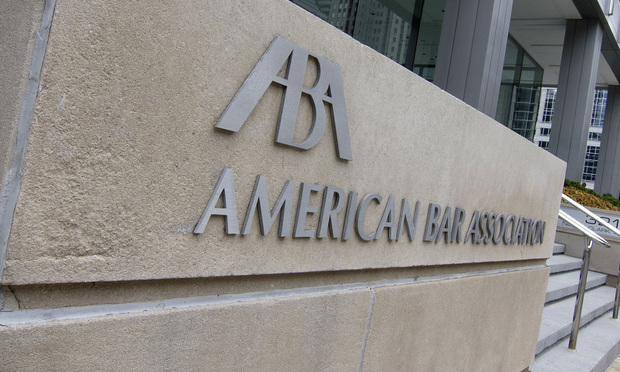After Bumpy Starts, Two More Law Schools Win Full ABA Approval
Both Lincoln Memorial University Duncan School of Law and Concordia University School of Law overcame early challenges to secure full accreditation from the American Bar Association, leaving just one provisionally accredited law school in the country.
March 04, 2019 at 02:26 PM
4 minute read
 American Bar Association in Chicago.
American Bar Association in Chicago.
Add Concordia University School of Law and Lincoln Memorial University Duncan School of Law to the list of law school fully accredited by the American Bar Association.
Both campuses ran into early accreditation problems and scrambled to ensure their first graduates could sit for the bar exam. But each overcome those challenges to win the ABA's full blessing in late February. Lincoln Memorial is located in Knoxville, while Concordia is in Boise, Idaho.
Lincoln Memorial Law dean Gary Wade acknowledged the school's rocky path to accreditation in a March 1 statement announcing its fully accredited status.
“This is a day of celebration for Lincoln Memorial University and especially for the Duncan School of Law,” said Wade, who is a former Tennessee Supreme Court Justice. “Over the last 10 years, our school has managed to hit a few potholes along the path to full approval by the American Bar Association, so success is all the sweeter.”
Concordia law dean Elena Langan called full approval “terrific news” for the school. “We have been working diligently toward this goal for several years and earning full accreditation by the ABA underscores our deep commitment to providing quality legal education and graduating students who not only become excellent attorneys, but leaders in their communities,” she said.
Both schools will be subject to a site visit by the ABA within three years, then will go on the 10-year reaccreditation site-visit schedule for fully accredited campuses, according to Barry Currier, the ABA's managing director for accreditation and legal education. With those approvals, the University of North Texas Dallas College of Law remains the only provisionally accredited school in the nation—a byproduct of the fact that no new law schools have opened recently amid legal education's downturn, Currier said. Five ABA-accredited schools have closed since 2017 or soon will close.
It took Lincoln Memorial, which opened in 2009, seven years to obtain full accreditation. The Tennessee Board of Law Examiners allowed the school's first graduates to take the state bar exam on the condition the campus get provisional ABA accreditation by 2012. But the ABA denied the school's application for provisional accreditation in late 2011 for what school administrators said were problems with admissions and academic support.
Lincoln Memorial responded by suing the ABA in federal court, claiming it “arbitrarily and capriciously denied” the school accreditation. A judge ruled against the school and it dropped the suit in October of 2012. Meanwhile, the state law examiners in 2012 extended the ability of graduates to take the local bar through 2017. But the school obtained provisional accreditation from the ABA in 2014, which allowed graduates to sit for the bar in the jurisdiction of their choosing.
Lincoln Memorial's run-ins with the ABA didn't end then, however. The ABA found the school out of compliance with its admissions standards in the spring of 2018, but determined it was back in compliance in November.
Concordia's road to full ABA accreditation also included various turns, though it never led into court. The law school opened in 2012 as part of the Portland Oregon-based Concordia University. The ABA's Council of the Section of Legal Education delayed a decision on the school's application for provisional approval in 2014 in order to allow a fact finder to visit the campus. That delay created uncertainty for the school's first class of graduates about whether they would be able to take the bar exam. The school had earlier asked the Idaho Supreme Court to step in to allow students to take the state bar exam, but the court refused. In the end, the school received provisional ABA accreditation in June 2015, which allowed the inaugural class to take the bar exam the following month.
This content has been archived. It is available through our partners, LexisNexis® and Bloomberg Law.
To view this content, please continue to their sites.
Not a Lexis Subscriber?
Subscribe Now
Not a Bloomberg Law Subscriber?
Subscribe Now
NOT FOR REPRINT
© 2025 ALM Global, LLC, All Rights Reserved. Request academic re-use from www.copyright.com. All other uses, submit a request to [email protected]. For more information visit Asset & Logo Licensing.
You Might Like
View All
Morgan Lewis Shutters Shenzhen Office Less Than Two Years After Launch


University of Chicago Accused of Evicting Student for Attending Gaza-Israel Protest
3 minute read
State Appellate Court Rejects Reasoning for Attorney's Removal From Conservatorship
5 minute readTrending Stories
- 1Invoking Trump, AG Bonta Reminds Lawyers of Duties to Noncitizens in Plea Dealing
- 222-Count Indictment Is Just the Start of SCOTUSBlog Atty's Legal Problems, Experts Say
- 3Judge Rejects Walgreens' Contractual Dispute Against Founder's Family Member
- 4FTC Sues PepsiCo for Alleged Price Break to Big-Box Retailer, Incurs Holyoak's Wrath
- 5Greenberg Traurig Litigation Co-Chair Returning After Three Years as US Attorney
Who Got The Work
J. Brugh Lower of Gibbons has entered an appearance for industrial equipment supplier Devco Corporation in a pending trademark infringement lawsuit. The suit, accusing the defendant of selling knock-off Graco products, was filed Dec. 18 in New Jersey District Court by Rivkin Radler on behalf of Graco Inc. and Graco Minnesota. The case, assigned to U.S. District Judge Zahid N. Quraishi, is 3:24-cv-11294, Graco Inc. et al v. Devco Corporation.
Who Got The Work
Rebecca Maller-Stein and Kent A. Yalowitz of Arnold & Porter Kaye Scholer have entered their appearances for Hanaco Venture Capital and its executives, Lior Prosor and David Frankel, in a pending securities lawsuit. The action, filed on Dec. 24 in New York Southern District Court by Zell, Aron & Co. on behalf of Goldeneye Advisors, accuses the defendants of negligently and fraudulently managing the plaintiff's $1 million investment. The case, assigned to U.S. District Judge Vernon S. Broderick, is 1:24-cv-09918, Goldeneye Advisors, LLC v. Hanaco Venture Capital, Ltd. et al.
Who Got The Work
Attorneys from A&O Shearman has stepped in as defense counsel for Toronto-Dominion Bank and other defendants in a pending securities class action. The suit, filed Dec. 11 in New York Southern District Court by Bleichmar Fonti & Auld, accuses the defendants of concealing the bank's 'pervasive' deficiencies in regards to its compliance with the Bank Secrecy Act and the quality of its anti-money laundering controls. The case, assigned to U.S. District Judge Arun Subramanian, is 1:24-cv-09445, Gonzalez v. The Toronto-Dominion Bank et al.
Who Got The Work
Crown Castle International, a Pennsylvania company providing shared communications infrastructure, has turned to Luke D. Wolf of Gordon Rees Scully Mansukhani to fend off a pending breach-of-contract lawsuit. The court action, filed Nov. 25 in Michigan Eastern District Court by Hooper Hathaway PC on behalf of The Town Residences LLC, accuses Crown Castle of failing to transfer approximately $30,000 in utility payments from T-Mobile in breach of a roof-top lease and assignment agreement. The case, assigned to U.S. District Judge Susan K. Declercq, is 2:24-cv-13131, The Town Residences LLC v. T-Mobile US, Inc. et al.
Who Got The Work
Wilfred P. Coronato and Daniel M. Schwartz of McCarter & English have stepped in as defense counsel to Electrolux Home Products Inc. in a pending product liability lawsuit. The court action, filed Nov. 26 in New York Eastern District Court by Poulos Lopiccolo PC and Nagel Rice LLP on behalf of David Stern, alleges that the defendant's refrigerators’ drawers and shelving repeatedly break and fall apart within months after purchase. The case, assigned to U.S. District Judge Joan M. Azrack, is 2:24-cv-08204, Stern v. Electrolux Home Products, Inc.
Featured Firms
Law Offices of Gary Martin Hays & Associates, P.C.
(470) 294-1674
Law Offices of Mark E. Salomone
(857) 444-6468
Smith & Hassler
(713) 739-1250








